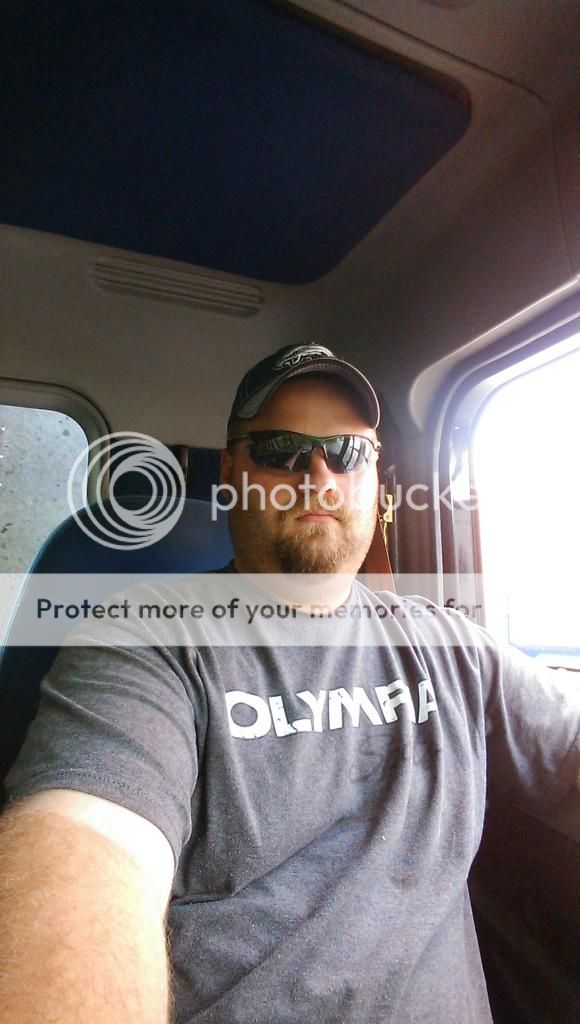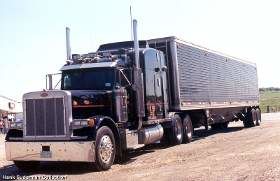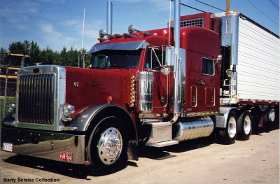Post Your Best Truck Driver Safety Habits Here:
Topic 9327 | Page 2

BTW, I'm on days now. Feel free to gimme a call if you still got my number.

Mirrors, mirrors, mirrors. Ill admit that I may even overuse my mirrors. That said though I don't think you can ever have enough information about your surroundings. Of course you want to pay attention to what's in front but the sides and rear are just as important.
When hooking a trailer, when you first get under it and engage the jaws give the trailer a good tug right away. Then after getting everything hooked up check the jaw position to make sure that they completely around the kingpin and tug another couple times to make sure they are locked. Trust me it only takes dropping a trailer once to wake you up from getting complacent. Don't let it come to that.
Dm:
Dispatcher, Fleet Manager, Driver Manager
The primary person a driver communicates with at his/her company. A dispatcher can play many roles, depending on the company's structure. Dispatchers may assign freight, file requests for home time, relay messages between the driver and management, inform customer service of any delays, change appointment times, and report information to the load planners.I've developed a habit of simply looking in the space between the tractor & trailer when I get in. Every time.
Is a trailer hooked up? Look at the air lines + electrical.
Dropping a trailer? Look the there's no air lines + electrical.
Fuel stop? Are the tank lids back on?*
* Walking through the trucks at a truck stop I noticed a fuel cap (no safety chain) laying open on a tractor. It had been raining and there was water in the upside-down cap. I knocked on the cab to tell the driver. "No, I didn't get fuel here," he says. "I just pulled in from Dallas."
The driver had just run 350 miles with the fuel cap simply laying on the catwalk!

Plan and repetition- by planning ahead and doing the same things over and over again. Your performance will undoubtly affect every aspect of your career safety included. Mind you it's okay to change things up as long as it may enhance your overall picture. As time goes by dropping trailers, looking in mirrors and driving at safe speeds becomes second nature.

One thing that was beaten into my head in trucking school is always check the release lever that controls the locking jaw around the Shank. Leave your truck for 3 minutes to run in and use the bathroom at a truck stop or rest area? Check it before you jump back in and take off. All it takes is that other driver you may have accidentally cut off pulling into that truck stop to decide to "teach you a lesson" by pulling your lever then next thing you know you have a 60,000 pound trailer fall to the pavement and you are at fault.
I check it anytime I'm away from my truck or been in my sleeper. It saved me one time. 3 weeks into driving I come out and check my lever and someone had pulled it. How terrible would that have been as a brand new driver having to call my boss saying I dropped a trailer? My first truck the lever was on the passenger side to for whatever reason.. it was incredibly annoying but I still checked it. Every dang time. A small thing really.. but it should be done. I can honestly say I have only ever seen one driver do this.. something so simple can save you from a terrible head ache later on.
I also like other people have said have on unhealthy obsession with checking my tires. Almost every time I stop I find myself walking around and checking them. Don't know why.. I just do. Gets me to walk more I guess instead of sitting in my truck for my 30 minute break.

One thing that was beaten into my head in trucking school is always check the release lever that controls the locking jaw around the Shank. Leave your truck for 3 minutes to run in and use the bathroom at a truck stop or rest area? Check it before you jump back in and take off. All it takes is that other driver you may have accidentally cut off pulling into that truck stop to decide to "teach you a lesson" by pulling your lever then next thing you know you have a 60,000 pound trailer fall to the pavement and you are at fault.
I check it anytime I'm away from my truck or been in my sleeper. It saved me one time. 3 weeks into driving I come out and check my lever and someone had pulled it. How terrible would that have been as a brand new driver having to call my boss saying I dropped a trailer? My first truck the lever was on the passenger side to for whatever reason.. it was incredibly annoying but I still checked it. Every dang time. A small thing really.. but it should be done. I can honestly say I have only ever seen one driver do this.. something so simple can save you from a terrible head ache later on.
I also like other people have said have on unhealthy obsession with checking my tires. Almost every time I stop I find myself walking around and checking them. Don't know why.. I just do. Gets me to walk more I guess instead of sitting in my truck for my 30 minute break.
+1 for this. My instructors in school told me this one too as well as when you stop for the night set the trailer brakes and pull the tractor forward to put pressure on the jaws n it makes it harder to pull the lever. I just hope i get a safety oriented trainer that will let me practice and develop good safety habits.
One thing that was beaten into my head in trucking school is always check the release lever that controls the locking jaw around the Shank. Leave your truck for 3 minutes to run in and use the bathroom at a truck stop or rest area? Check it before you jump back in and take off. All it takes is that other driver you may have accidentally cut off pulling into that truck stop to decide to "teach you a lesson" by pulling your lever then next thing you know you have a 60,000 pound trailer fall to the pavement and you are at fault.
I check it anytime I'm away from my truck or been in my sleeper. It saved me one time. 3 weeks into driving I come out and check my lever and someone had pulled it. How terrible would that have been as a brand new driver having to call my boss saying I dropped a trailer? My first truck the lever was on the passenger side to for whatever reason.. it was incredibly annoying but I still checked it. Every dang time. A small thing really.. but it should be done. I can honestly say I have only ever seen one driver do this.. something so simple can save you from a terrible head ache later on.
I also like other people have said have on unhealthy obsession with checking my tires. Almost every time I stop I find myself walking around and checking them. Don't know why.. I just do. Gets me to walk more I guess instead of sitting in my truck for my 30 minute break.
+1 on both accounts, especially the tire obsession. I often check the tires before getting in to drive. Heck I'm even known to look at the tires of vehicles around me, I've left notes on cars with dangerously low tires and pointed low passenger tires out to people on the road. I'm sure I've prevented at least one accident with my casual observations and taking a moment to say something when I could have just said nothing and gone about my business.

What MG is talking about here are called mnemonics. It's a memory tool that's used all the time in aviation ( example, your pre landing checklist is GUMPS. Gas- selected tank is fullest, Undrcarrage-gear down, Mixture-full rich, Pump, fuel pump on, Switches,- landing, nav and strobe lights on. )
I haven't come up with any for trucking yet, but as previously stated, routine, routine, routine. The same way everytime, everyday.
Habits I've developed are 1. Anytime I leave the truck, I always do a walk around when I come back. This includes checking the reefer temp, reefer tank, door seals and lock.
2. When backing I always roll the windows down and turn on the hazards. I also always check my right mirror when I'm backing to catch anything that might be moving on my blind side. When I have the trailer in front of the hole I always get out and look
3. Wipers on, lights on. This is a law in some states. I also turn my lights on during overcast days.
4. Cruise off during heavy traffic or construction areas. Also, cruise off during winter conditions.
Reefer:
A refrigerated trailer.
For me this far, it's a multitude of things. Pre trip always (mainly because I worked on trucks long enough that I'm anal as can be about problems), SMITH system in over abundance, watch my turns carefully and control my speed. It only takes one slip up for something bad to happen.
New Reply:
New! Check out our help videos for a better understanding of our forum features

















Preview:
This topic has the following tags:
Pre-trip inspection (PTI) Safe Driving Tips







 TT On Facebook
TT On Facebook
MG, I've got some tips when pulling doubles , when you're scratching that linehaul itch.
Linehaul:
Linehaul drivers will normally run loads from terminal to terminal for LTL (Less than Truckload) companies.
LTL (Less Than Truckload) carriers will have Linehaul drivers and P&D drivers. The P&D drivers will deliver loads locally from the terminal and pick up loads returning them to the terminal. Linehaul drivers will then run truckloads from terminal to terminal.Doubles:
Refers to pulling two trailers at the same time, otherwise known as "pups" or "pup trailers" because they're only about 28 feet long. However there are some states that allow doubles that are each 48 feet in length.